The Right Honourable facts for kids
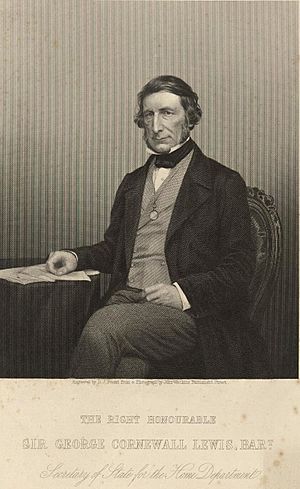
The Right Honourable (sometimes written as The Rt Hon.) is a special title given to important people. It shows they hold a high position or honor. This title is mainly used in the United Kingdom, Canada, Australia, New Zealand, and other countries that are part of the Commonwealth. In the United Kingdom today, members of the Privy Council of the United Kingdom are given this title. These are usually current or past members of Parliament who have served as cabinet ministers in the government.
Contents
Countries Using This Title
United Kingdom
Who Gets the Title in the UK?
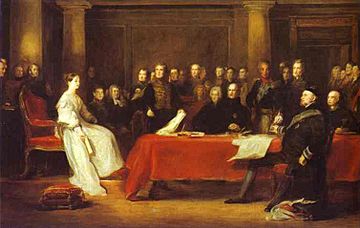
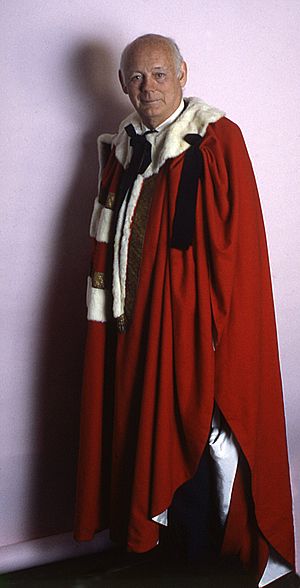
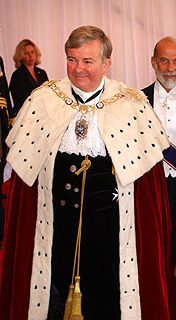
The British government says that the following people can use the title Right Honourable:
- Members of the Privy Council: This group advises the King or Queen. Important politicians and officials are made members for life. Once they are members, they can use the title Right Honourable.
- Certain Noble Titles: People who hold the titles of Earl or Countess, Viscount or Viscountess, and Baron or Baroness are also called Right Honourable. Their wives or widows can also use this title.
- Lord Mayors and Lord Provosts: The Lord Mayors of London, Cardiff, Belfast, Bristol, and York, and the Lord Provosts of Edinburgh and Glasgow, use this title while they are in office. This title belongs to their job, not to their personal name.
Privy Council Members
The King or Queen appoints Privy Council members based on the Prime Minister's advice. They stay members for life. Many important people become Privy Council members, including:
- All members of the Cabinet (the main group of government ministers).
- Senior members of the main opposition party.
- The leaders of the biggest political parties in Parliament.
- The Speaker of the House of Commons (who leads debates).
- The First Ministers of Scotland, Wales, and Northern Ireland.
- Senior judges.
- Important members of the royal family.
Because of this, many current and former important politicians in the UK are called Right Honourable.
How Members of Parliament Speak to Each Other
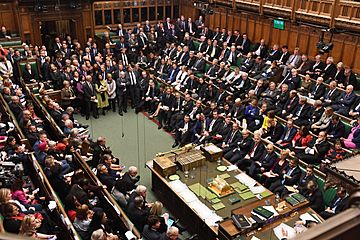
In the House of Commons, members cannot speak directly to each other or use their names. Instead, they must speak to the Speaker and refer to other members indirectly. This helps keep discussions polite.
- Members usually call each other "my honourable friend" if they are from the same political party.
- If they are from different parties, they say "the honourable gentleman/lady/member."
- If a member is also a Privy Counsellor (and so is Right Honourable), they are called "the right honourable member."
- Sometimes, extra words are used for certain jobs:
- "(Right) honourable and reverend" for clergy (religious leaders).
- "(Right) honourable and gallant" for military officers.
- "(Right) honourable and learned" for barristers (lawyers).
Groups Using the Title
The title Right Honourable is also used for some important groups, such as:
- "The Right Honourable the Lords Spiritual and Temporal in Parliament Assembled" (this means the House of Lords).
- "The Right Honourable the Lords of the Privy Council" (this means the Privy Council).
Canada
In Canada, only three very important public officials are called Right Honourable (or Le/La très honorable in French). These are:
- The Governor General of Canada (the King's representative).
- The Prime Minister of Canada (the head of government).
- The Chief Justice of Canada (the head of the highest court).
Once someone holds one of these jobs, they keep the title Right Honourable for life. Sometimes, the Governor General can also give this title for life to other very important Canadians, even if they haven't held these specific jobs.
| Person | Birthplace | Office | Born | Granted |
|---|---|---|---|---|
| Justin Trudeau | Ottawa, Ontario | Prime minister | 25 December 1971 | 4 November 2015 |
| Stephen Harper | Toronto, Ontario | Former prime minister | 30 April 1959 | 6 February 2006 |
| Paul Martin | Windsor, Ontario | Former prime minister | 28 August 1938 | 12 December 2003 |
| Jean Chrétien | Shawinigan, Quebec | Former prime minister | 11 January 1934 | 4 November 1993 |
| Kim Campbell | Port Alberni, British Columbia | Former prime minister | 10 March 1947 | 25 June 1993 |
| Brian Mulroney | Baie-Comeau, Quebec | Former prime minister | 20 March 1939 | 17 September 1984 |
| Joe Clark | High River, Alberta | Former prime minister | 5 June 1939 | 4 June 1979 |
| Mary Simon | Fort Severight, Quebec | Governor general | 21 August 1947 | 26 July 2021 |
| Julie Payette | Montreal, Quebec | Former governor general | 20 October 1963 | 2 October 2017 |
| David Johnston | Sudbury, Ontario | Former governor general | 28 June 1941 | 1 October 2010 |
| Michaëlle Jean | Port-au-Prince, Haiti | Former governor general | 6 September 1957 | 27 September 2005 |
| Adrienne Clarkson | Hong Kong | Former governor general | 10 February 1939 | 7 October 1999 |
| Edward Schreyer | Beausejour, Manitoba | Former governor general | 21 December 1935 | 22 January 1979 |
| Richard Wagner | Montreal, Quebec | Chief justice | 2 April 1957 | 18 December 2017 |
| Beverley McLachlin | Pincher Creek, Alberta | Former chief justice | 7 September 1943 | 7 January 2000 |
New Zealand
In New Zealand, the Prime Minister, Governor-General, Chief Justice, and Speaker of the House of Representatives are now given the title Right Honourable for life. This change happened in 2010. Before that, New Zealanders received the title by being appointed to the UK's Privy Council.
| Name | Reason | Date Granted |
|---|---|---|
| Sir Anand Satyanand | Former Governor-General | 2 August 2010 |
| Sir John Key | Former Prime Minister | |
| Sir Lockwood Smith | Former Speaker of the House of Representatives | |
| Sir Jerry Mateparae | Former Governor-General | 31 August 2011 |
| Sir David Carter | Former Speaker of the House of Representatives | 31 January 2013 |
| Dame Patsy Reddy | Former Governor-General | 28 September 2016 |
| Sir Bill English | Former Prime Minister | 12 December 2016 |
| Dame Jacinda Ardern | Former Prime Minister | 26 October 2017 |
| Trevor Mallard | Former Speaker of the House of Representatives | 7 November 2017 |
| Dame Helen Winkelmann | Chief Justice | 14 March 2019 |
| Dame Cindy Kiro | Governor-General | 21 October 2021 |
| Adrian Rurawhe | Former Speaker of the House of Representatives | 24 August 2022 |
| Chris Hipkins | Former Prime Minister | 25 January 2023 |
| Christopher Luxon | Prime Minister | 27 November 2023 |
| Gerry Brownlee | Speaker of the House of Representatives | 5 December 2023 |
Other Countries Using the Title
- East Africa: The prime ministers of Namibia and Uganda are currently styled Right Honourable. The speaker and deputy speaker of the Parliament of Uganda also use this title.
- Caribbean: The prime ministers of Grenada, Saint Lucia, Saint Vincent and the Grenadines, and Trinidad and Tobago are called Right Honourable.
- Malaysia: In Malaysia, the Prime Minister, his or her deputy, and some high court judges are styled Right Honourable. At the state level, chief ministers and premiers also use this title.
- Nepal: In Nepal, the President, Vice President, Prime Minister, and Chief Justice are formally called Right Honourable.
- South Korea: In South Korea, the President, Prime Minister, Speaker of the National Assembly, and Chief Justice can use the Right Honourable style.
Historic Usage in Other Countries
Australia
In Australia, the Lord Mayors of Adelaide, Brisbane, Hobart, Melbourne, Perth, and Sydney are called Right Honourable while they are in office. In the past, some Australians also received this title by becoming members of the UK's Privy Council. However, Australian governments no longer recommend people for this title.
| Living Australians with the Title The Right Honourable | Reason | Formerly |
|---|---|---|
| Ian Sinclair, AC | Member of the Privy Council of the Kingdom | Former Speaker of the Australian House of Representatives |
| Sir William Heseltine, GCB, GCVO, AC | Member of the Privy Council of the United Kingdom | Former Private Secretary to the Sovereign |
| Trixie Gardner, Baroness Gardner of Parkes, AM, JP | Life peer and House of Lords member | Former Councillor on the Westminster City Council |
| Malcolm Murray, 12th Earl of Dunmore | Earl of Dunmore | Former Member of the House of Lords |
| Robert Fiennes-Clinton, 19th Earl of Lincoln | Earl of Lincoln | |
| Simon Abney-Hastings, 15th Earl of Loudoun | Earl of Loudoun | |
| George Dawson-Damer, 7th Earl of Portarlington | Earl of Portarlington | |
| Keith Rous, 6th Earl of Stradbroke | Earl of Stradbroke | |
| Francis Grosvenor, 8th Earl of Wilton | Earl of Wilton | |
| Nicholas St John, 9th Viscount Bolingbroke, 10th Viscount St John | Viscount Bolingbroke | |
| Charles Cavendish, 7th Baron Chesham | Baron Chesham | |
| James Lindsay, 3rd Baron Lindsay of Birker | Baron Lindsay of Birker | |
| David Campbell, 7th Baron Stratheden and Campbell | Baron Stratheden |
Ireland
Members of the Privy Council of Ireland used to be called Right Honourable. Even after this council stopped working in 1922, the Lord Mayor of Dublin kept the title until 2001.
Sri Lanka
In Sri Lanka (which was once called Ceylon), the British way of using the title was followed. Ceylonese members of the UK's Privy Council were called Right Honourable.
See also
 In Spanish: Muy Honorable para niños
In Spanish: Muy Honorable para niños
 | Anna J. Cooper |
 | Mary McLeod Bethune |
 | Lillie Mae Bradford |

